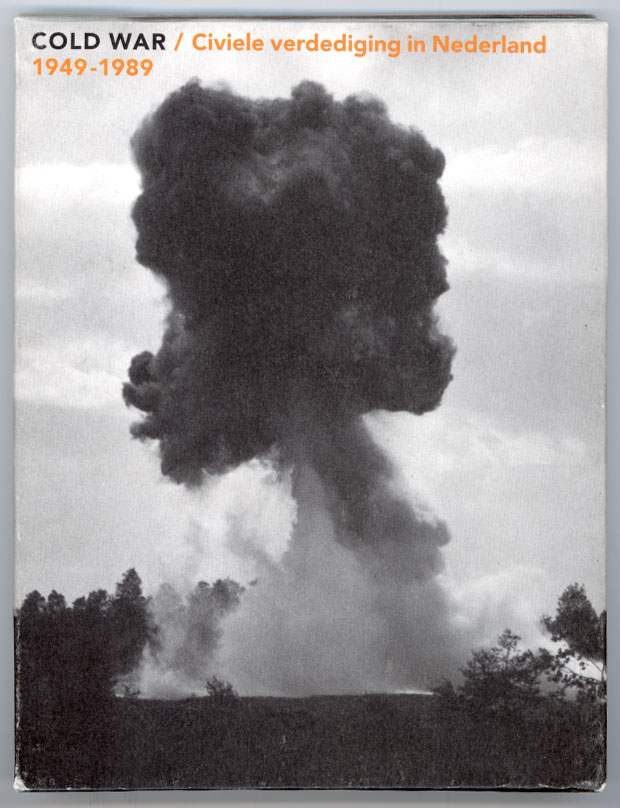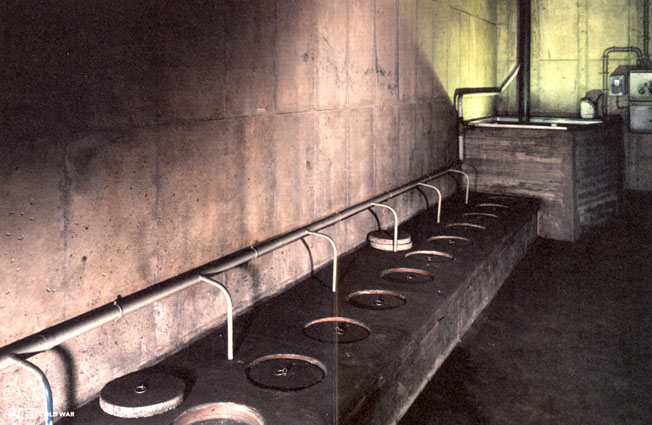


please remove all of your clothes before running into your house after an attack of mustard gas. you can leave your socks on.
photo: Archive

air defense observation tower, 1964. the small shelter is from 1968 and offers fall-out protection for total of 4 people
photo: Sorgerdrager

dormitory in the National Command post in Utrecht.
photo: Sorgerdrager

a wool-lined raincoat. photo: Archive National Fire Brigade Amsterdam

Chimneys are the most stable part of the house. kneel next to it and cover your eyes, or pray, or both. One of the 2 might save you.
photo: Archive. Studio Meyer, The Hague

Latrines in a public shelter, built 1963-1965 for a total capacity of 28,750 people.
photo: Sorgerdrager

Turn on your radio.
photo: Achive. Studio Meyer, The Hague

Bart Sorgedrager
Cold War, Civil Defense in the Netherlands 1949-1989 – Leporello 1997
I just got back from Paris and once again I was reminded of 3 things:
Paris is amazing, expensive, and home to what must be the most ridiculous airport in the western world. Charles De Gaulle Terminal 1 is worth seeing, but do it as a tourist after flying into Orly.
Which leads me to one of my favorite little books I brought home from Paris Photo, Cold War from Bart Sorgerdrager. It is quite ironic that my flight home from CDG airport on Sunday saw me pulling this little leporello out of my bag and thinking “let me see, do I dive for the chimney, take off my clothes, or turn on the radio……”
Not to make light of terrorist activities, but when someone left their suitcase at gate 34, (literally my exact gate) the security commando at the airport had the brilliant plan of just pushing a crowd of 200 people back behind a line on the linoleum floor. I found myself looking for the nearest exit or a sturdy table to dive under. We were all confused and though I wouldn’t say anyone was panicking, there was a hum of energy present which kept everyone on edge; adrenaline I suppose.
Unfortunately we weren’t as informed or prepared for aggressive attacks as the population of Holland was during the Cold War period of 1949-1989.
The photographer Bart Sorgedrager gave me an interesting little book he made in 1997 in which he combines images from a booklet which was distributed to every household in Holland in 1961 informing its citizens about what to do in case of an attack. Preparation, ranging from stockpiling oil, medicine, and food as well as learning a few basic survival techniques was intended to boost morale and thus enable the country to successfully meet the ultimate test of the approaching WW III.
The archive images show staged b/w images, often hand colored with white to highlight what is important in the image. When, later in the 80’s, people realized that the tactics of a nuclear war would result in complete annihilation anyway, this little pamphlet came to be seen as a joke.
Bart Sorgedrager, with the support of the Military Museum in Delft, researched and documented remaining structures and artifacts which are still visible in Holland. His beautiful color images pick up on the same dead-pan aesthetic as the original images and reveal the fact that these places and rooms seem as unsuited for their initial intent, as were the tips of the Civil Defense Organization.
There are 34 pages to this endless accordion-style leporello, printed on both sides which is why there are essentially 2 covers. You can keep turning and turning pages, indefinitely, if you want, as it never seems to end, so in some ways it did save me at the airport, by keeping me busy for an hour and my mind off that suitcase that we were sure would go off any moment.
Now the bad news. I have no idea where to get this book. Bart is well known for his ongoing series of publications about “factories without chimneys”, a study of European factories keeping their headquarters in Europe but moving production (the chimneys) to Asia and the East.
I haven’t hyperlinked Barth’s name anywhere in this text because I can’t find any site dedicated to his work. I would suggest starting here, at the site of the Dutch critic Ralf Prins called Bint.
This is a site I visit often as he posts frequently and in-depth. I have asked Bart to give me some info about a special edition book which I saw but don’t have, so when he gets back to me, maybe I can pass on more info.
I am excited that I have found some 1 liter cans of “instant water”. I am stockpiling them in my darkroom. They are great, you only have to add 1000 ml of water.